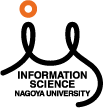Comprehensive List of Researchers "Information Knowledge"
Department of Media Science
- Name
- TERAI,Hitoshi
- Group
- Cognitive Informatics Group
- Title
- Designated Associate Professor
- Degree
- Dr. of Information Science
- Research Field
- Cognitive science / Problem solving / Insight problem solving / Information seeking behavior

Current Research
Cognitive scientific study of insight problem solving process
Cognitive scientific study of insight problem solving processThe insight process is generally characterized by suddenly finding a solution in problem solving. On the other hand, recent cognitive studies have indicated that the insight process involves a gradual process of approaching the solution. In this study, we investigated such bifacial characteristics of the insight process from the viewpoint of a hypothesis search process by psychological experiments, and tried to explain how these characteristics arise using a computer simulation model. In the computer simulation model, we assumed that the insight process consists of two qualitatively different types of hypothesis search processes in which reinforcement and chunking learning methods are used. The results of computer simulation models indicated that both sudden and gradual characteristics arose from the interaction of these processes in problem solving.
Modeling and Detecting Over-trust from Behavior Signals
In this study, we experimentally investigated human use of automation systems and the selection strategies of its usage. When ability of automation systems are decreased in trouble, over-trust in the systems can cause serious accidents. Therefore, clarifying cognitive bias of trust in automation systems and its changes are crucial issues for cooperation between human and systems. Moreover, we experimentally evaluate consistency of system usage behavior between experimental environments (laboratory settings, simulator settings, and real world settings) that have different level of abstraction.
Cognitive Research for Exploratory Search
The Cognitive Research for Exploratory Search project's goal is to investigate user's behavior and cognitive processes during various information seeking tasks on the web. Various users' activities were collected for analysis by using eye-trackers, think-aloud, etc., for the purpose of designing better interactive IR systems for exploratory searches. This project is supported by a National Institute of Informatics joint research grant.
Career
- The Degree of Doctor of Information Science, Graduate School of Information Science, Nagoya University
- Research Associate, Nagoya University Library Studies
- Research Associate, School of Information Environment, Tokyo Denki University
Academic Societies
- Japanese Cognitive Science Society
- The Japanese Society for Artificial Intelligence
- Cognitive Science Society
- Japan Society of Library and Information Science
Publications
- Terai, H., Saito, H., Egusa, Y., Takaku, M., Miwa, M., & Kando, N. (2008). Differences between informational and transactional tasks in information seeking on the Web. Proceedings of Second Symposium on Informational Interaction in Context, 152-159.
- Terai, H. & Miwa, K. (2006). Sudden and Gradual Processes of Insight Problem Solving: Investigation by Combination of Experiments and Simulations. Proceedings of 28th Annual Meeting of the Cognitive Science Society, 834-839.
- Terai, H., Miwa, K., & Koga, K. (2005). Insight Problem Solving from the Viewpoint of Searches for Hypothesis and Data Spaces. Cognitive Studies, vol. 12, no. 2, 74-88, in Japanese.








